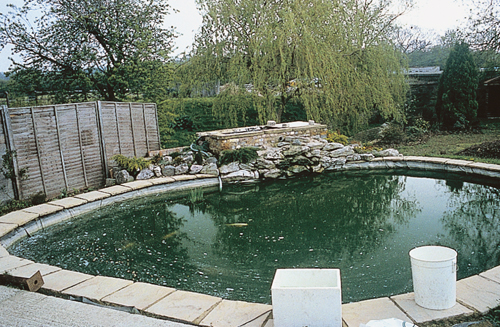Difference between revisions of "Ornamental Fish Q&A 18"
(Created page with "[[|centre|500px]] <br /> '''This koi pond developed a profuse bloom of algae in early summer.''' <br /> <FlashCard questions="2"> |q1=What factors would cause this sudden alg...") |
|||
| (2 intermediate revisions by 2 users not shown) | |||
| Line 1: | Line 1: | ||
| − | [[|centre|500px]] | + | {{Manson |
| + | |book = Ornamental Fish Q&A}} | ||
| + | |||
| + | [[File:Ornamental Fish 18.jpg|centre|500px]] | ||
<br /> | <br /> | ||
| Line 13: | Line 16: | ||
Fresh nutrients are provided by the addition of tap water to top off the pond following evaporation or during routine water changes. The run off of fertilizer from the soil may add further nutrients to the pond water. | Fresh nutrients are provided by the addition of tap water to top off the pond following evaporation or during routine water changes. The run off of fertilizer from the soil may add further nutrients to the pond water. | ||
| − | |l1= | + | |l1=Algal Bloom |
|q2=What clinical problems are associated with these water conditions? | |q2=What clinical problems are associated with these water conditions? | ||
|a2= | |a2= | ||
| Line 21: | Line 24: | ||
In addition to indirect stress, the clinical effects of high pH levels include damage to the skin and gills, corneal opacity, increased toxicity of ammonia, and often death from metabolic alkalosis. | In addition to indirect stress, the clinical effects of high pH levels include damage to the skin and gills, corneal opacity, increased toxicity of ammonia, and often death from metabolic alkalosis. | ||
| − | |l2= | + | |l2=Algal Bloom |
</FlashCard> | </FlashCard> | ||
Latest revision as of 22:31, 30 October 2011
| This question was provided by Manson Publishing as part of the OVAL Project. See more Ornamental Fish Q&A. |
This koi pond developed a profuse bloom of algae in early summer.
| Question | Answer | Article | |
| What factors would cause this sudden algal growth? | The growth of algae in freshwater fish ponds depends on temperature, light, and nutrient supply. Fresh nutrients are provided by the addition of tap water to top off the pond following evaporation or during routine water changes. The run off of fertilizer from the soil may add further nutrients to the pond water. |
Link to Article | |
| What clinical problems are associated with these water conditions? | Although algae produce oxygen by photosynthesis during the day, they extract oxygen from the water at night. Without extra aeration using air stones, waterfalls, fountains, or a venturi, the dissolved oxygen may drop to lethal levels and cause fish to die from anoxia, typically in the early morning hours. Algae take up carbon dioxide from the water during daylight hours and this produces an increase in pH. The amount of increase is determined by the buffering capacity of the water and the rate of photosynthesis. In this pond an electronic meter revealed a pH of 11.0 at midday. In addition to indirect stress, the clinical effects of high pH levels include damage to the skin and gills, corneal opacity, increased toxicity of ammonia, and often death from metabolic alkalosis. |
Link to Article | |
